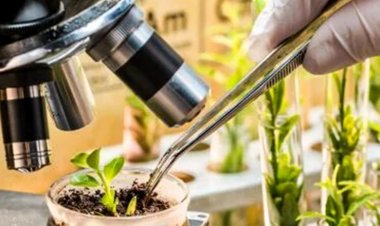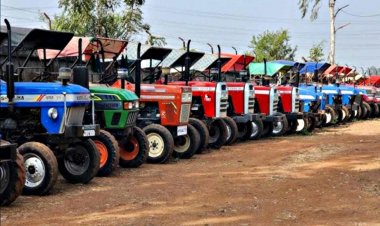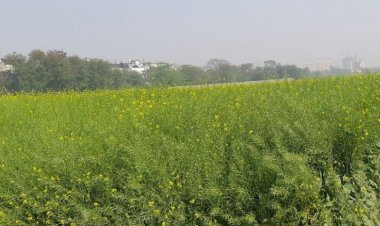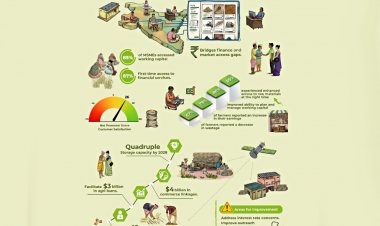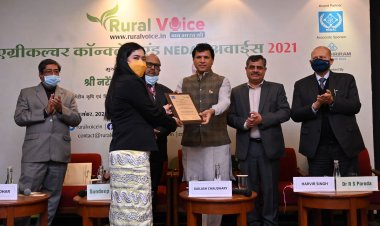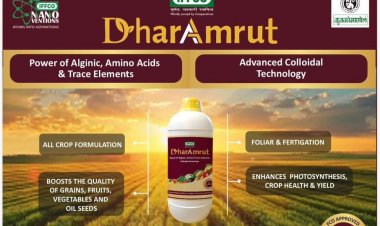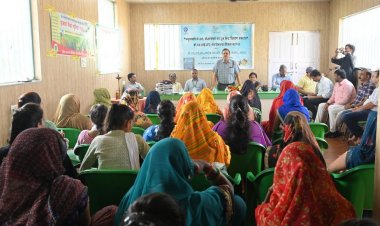Established and existing procedure for fertilizer registration followed in approval to nano urea: Govt
The Union Government has said that the established and existing procedure for the registration of any fertilizer for notification as per FCO, 1985, has been fully accounted for in the case of granting approval to nano urea. Nano urea has been notified under the FCO, based on encouraging results and feedback received from scientists of ICAR and SAUs.
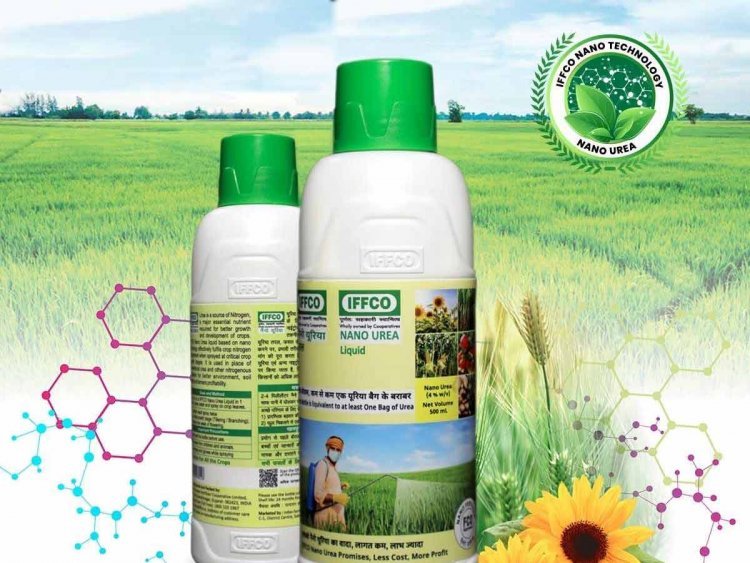
The Union Government has said that the established and existing procedure for the registration of any fertilizer for notification as per Fertiliser Control Order (FCO), 1985, has been fully accounted for in the case of granting approval to nano urea. Nano urea has been notified under the FCO, based on encouraging results and feedback received from scientists of the Indian Council of Agricultural Research (ICAR) and the State Agricultural Universities (SAUs). This was stated in a press release from the Union Ministry of Chemicals and Fertilisers on Sunday evening.
Terming the news report alleging that “nano urea has been fast-tracked for approval despite incomplete trials” as “erroneous” and “misinformed”, the government has said that it presents a partial view of the existing facts and data available on the subject. In the press release from the government, information has been furnished in detail on the trials of nano urea conducted on crops and the results of the nano urea tests conducted on various crops by the ICAR and the SAUs.
The Indian Farmers and Fertiliser Cooperative (IFFCO), the country’s largest fertilizer producer and marketing cooperative, had launched nano urea in the market in June 2021. IFFCO has established plants to produce nano urea. In view of its sales across the country, it is setting up new production capacities of nano urea, which is being used as a substitute for conventional urea.
The statement released by the Fertilizer Ministry says that it has been wrongly quoted in the news report that the process of approval to nano urea has been "fast-tracked". It clarifies that the established and existing procedure for registration of any fertilizer for notification as per FCO, 1985, has been fully accounted for. Nano urea has been notified provisionally under FCO based on the existing procedure for the introduction of fertilizers under FCO, 1985, which requires data from only two seasons. The notification is based on encouraging results and feedback received from scientists of ICAR and SAUs. The Central Fertilizer Committee (CFC), Ministry of Agriculture and Farmers Welfare (MoA&FW), has also recommended it based on data and due deliberations in this regard. In addition, the Department of Biotechnology (DBT) has also been referred to for safety and biosafety issues. It is only after satisfaction with regard to efficacy, biosafety and biotoxicity that nano urea has been brought under FCO as a separate category of nano fertilizer.
Furthermore, says the release, the data is not limited to two seasons as has wrongly been communicated through the news report. Research and farmer field trials have been continued for last more than four seasons.
Consistent results have been recorded without any detriment to soil health/fertility status (Table 1).
Table 1. Season-wise/crop-wise experimental trials undertaken
|
Experiments |
Season |
Crops & Trials (Nos.) |
|
“On Station” Trials |
Rabi 2019-20 (24 Nos.) |
Cereals: Wheat (11); Oilseeds: Mustard (1); Vegetables: Onion (2); Capsicum (1), Cabbage (1), Tomato (3); Parthenocarpic cucumber under polyhouse (1) Sugar Crops: Suru sugarcane (1) |
|
Summer 2019-20 (3 Nos.) |
Cereals: Paddy (1); Maize (2) |
|
|
Kharif 2020 (16 Nos.) |
Cereals: Paddy (6); Maize (5); Pear millet (3) Fibres: Cotton (1) Vegetables: Okra (1) |
|
|
Rabi 2020-21 (8 Nos.) |
Cereals: Wheat (6); Oilseeds: Mustard (1); Vegetables: Onion (1) |
|
|
Summer 2020-21 (2 Nos.) |
Cereals: Paddy (1); Maize (1) |
|
|
Kharif 2021 (21 Nos.) |
See Table 2 |
|
|
|
Rabi 2021-22 (19 Nos.) |
Wheat (8); Rapeseed/Mustard (3); Onion (1); Groundnut (1); Sunflower (1); Ginger (1), Turmeric (1), Sugarcane (1), Paddy(1), Maize (1) |
|
|
Kharif- 2022 (7 Nos.) |
Paddy (3); Apple (1), Bajra (1); Finger millet (2) |
|
|
Rabi -2022-23 (6 Nos.) |
Continued |
|
“On Farm” Trials |
Rabi 2019-20 |
93 crops; 11224 trials (9037 recorded) |
|
Kharif 2020 |
44 crops; 1511trials (1435 recorded) |
|
|
Rabi 2020-21 |
34 crops; 1126 trials |
|
|
Total |
11,598 trials |
For evaluation of nano urea, the release says, premium ICAR research institutes and SAUs have been at the vanguard of trials. Different aspects associated with crop productivity, reduction in fertilizer dosage, and farmers’ profitability have been addressed through these trials. A list of some key research institutes/SAUs engaged in nano urea trials are as under (Table 2).
|
SN |
Crops |
Location |
Season/Year Onwards |
|
|
1 |
Maize |
ICAR- CRIDA, Hyderabad, Telangana |
Kharif 2021 |
|
|
2 |
Finger millet |
AICRPDA Centre, Bengaluru |
Kharif 2021 |
|
|
3 |
Upland rice |
AICRPDA Centre, Jagdalpura, Chhattisgarh |
Rabi 2021-22 |
|
|
4 |
Irrigated rice |
IRRI-ISARC, Varanasi |
Kharif 2021 |
|
|
5 |
Rainfed rice |
IRRI-ISARC, Varanasi |
Kharif 2021 |
|
|
6 |
Rainfed rice |
IRRI-ISARC, Assam |
Kharif 2021 |
|
|
7 |
Wheat |
CSSRI Karnal, Haryana |
Rabi 2020-21 |
|
|
8 |
Paddy |
CSSRI Karnal, Haryana |
Kharif 2021 |
|
|
9 |
Wheat |
AAU, Anand, Gujarat |
Rabi 2019-20 |
|
|
10 |
Maize |
AAU, Anand, Gujarat |
Kharif 2021 |
|
|
11 |
Wheat |
ANDUAT, Ayodhya, UP |
Rabi 2019-20 |
|
|
12 |
Wheat |
MPUAT, Udaipur, Rajasthan |
Rabi 2019-20 |
|
|
13 |
Wheat |
SKNAU, Jobner, Rajasthan |
Rabi 2019-20 |
|
|
14 |
Wheat |
IARI, New Delhi |
Rabi 2019-20 |
|
|
15 |
Mustard |
IARI, New Delhi |
Rabi 2019-20 |
|
|
16 |
Pearl millet |
IARI, New Delhi |
Kharif 2019-20 |
|
|
17 |
Wheat |
BAU, Ranchi |
Rabi 2019-20 |
|
|
18 |
Paddy |
UAHS, Shivamoga, Karnataka |
Rabi 2019-20 |
|
|
19 |
Paddy |
TNAU (Bhavanisagar Stn.) Drone Expt |
Kharif 2021 |
|
|
20 |
Maize |
UAS GKVK, Karnataka |
Summer 2019-20 |
|
|
21 |
Maize |
PJTSAU, Telangana |
Summer 2019-20 |
|
|
22 |
Onion |
MPKVV, Rahuri, Maharashtra |
Rabi 2019-20 |
|
|
23 |
Cabbage |
IIHR, Bengaluru, Karnataka |
Rabi 2019-20 |
|
|
24 |
Cucumber |
IIHR, Bengaluru, Karnataka |
Rabi 2019-20 |
|
According to the release, the summary of results of the application of the nano urea liquid (Nano N) across different locations and agro-climatic regions has revealed that the foliar application of nano urea at critical growth stages of crops like rice, wheat, maize, tomato, cucumber and capsicum leads to a reduction in the application of nitrogenous fertilizers and also increases yield in the range of 3-23 per cent in wheat, 5-11 per cent in tomato, 3-24 per cent in paddy/rice, 2-15 per cent in maize, 5 per cent in cucumber and 18 per cent in capsicum.
The press release issued by the government says that science and scientific endeavours are a continuous process and significant efforts go into the process from concept to translation stage. Nano fertilizers are novel in the way that they provide immense opportunity in terms of addressing the challenges being faced by intensive agriculture practices currently underway which are ultimately harming the soil, air and water in the long run. It is, therefore, prudent that nano fertilizers like nano urea are holistically viewed from the perspective of declining nutrient use efficiency (NUE) of chemical fertilizers and alternative solutions that need to be made available to farmers.



 Join the RuralVoice whatsapp group
Join the RuralVoice whatsapp group

















